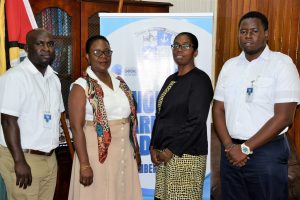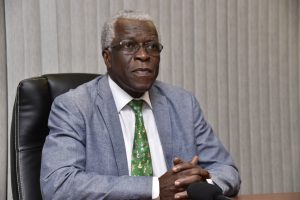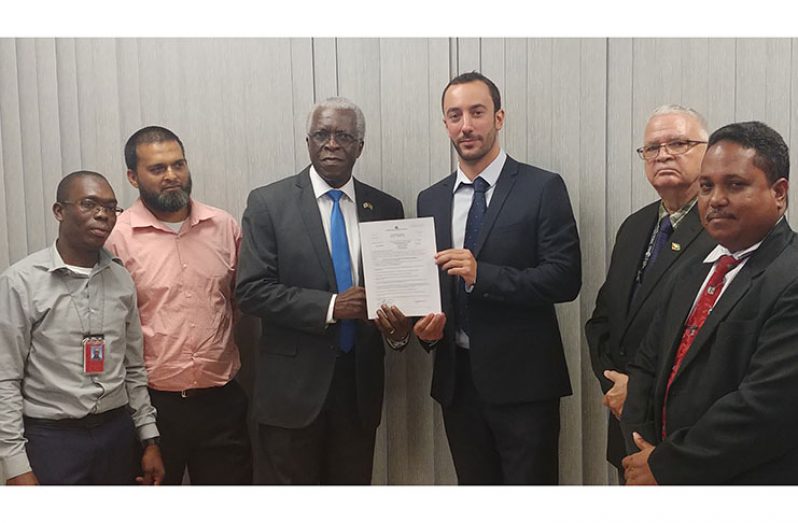
the stern of the vessel. The helideck is a landing
for helicopters on ships and oil platforms.
A THOROUGH Local Content Policy helps guide Guyanese involvement in our emerging oil and gas sector. The Department of Energy and the Government of Guyana recognises this crucial step in ensuring Guyana’s natural resources are managed sustainably for the benefit of all Guyanese.
In this edition of Government in Action, we hear from representatives of the Civil Aviation Authority and the Maritime Administration Department (MARAD), some of the Guyanese leading the race to first oil 2020.
Building expertise
Since the Department of Energy’s establishment on August 1st of last year, it has focused on two main things: dealing with historical contracts and establishing the framework that will inform the contracts to come. The Department has looked closely at the legal environment so that Guyanese can get the best from Guyana’s natural resources.
To help fill some of the gaps, Director, Department of Energy, Dr. Mark Bynoe said the Department will continue to make the necessary revisions and adjustments to build the comprehensive and robust framework that will govern the sector.

operations onboard Tullow Oil’s Stena Forth drillship,
which is operating in the Orinduik Block.
“This requires a revision, for example, of the 1986 Petroleum and Production Exploration Act. It also requires us to be more conversant on issues of a mid- and downstream nature, meaning how do we treat with elements of refineries, how do we treat with elements of gas coming to shore, how do we treat even with the commissioning… So, we have looked at where the gaps exist not only within that legislation but also within our sister agencies and now we are building-out to revise the requisite legislation and to allow us to ultimately have a robust framework to govern this sector,” the Energy Director said.
Dr. Bynoe stressed that at this crucial time in the oil sector, it is vital to have Guyanese work alongside foreign experts. This will lay the foundation for the future of the industry, run by Guyanese.
“[It has] been important for us to recruit the requisite expertise and the approach we have adopted is to hiring those expertise wherever they are found; having Guyanese work alongside so that you can have the transfer of knowledge and mentoring take place, so that ultimately, you can have Guyanese take on a larger proportion of management of the sector as we go forward,” he said.
These efforts, Dr Bynoe said, are all aimed at increasing the revenue for Guyana.
“We have been keen to ensure also that we have greater value retention in this sector… You would have heard a lot of discussion around local content and it is in our interest to ensure that we are having a greater volume of services and goods coming from Guyanese sources. Thus, it reduces recoverable cost from that perspective and enhances the revenue take for Guyana and Guyanese,” he said.
The importance of collaboration
The Department of Energy has always valued the importance of a collaborative effort. Dr. Bynoe insists that when decisions are made, they are made through a consensus position. Without the participation of other key agencies the arrival of the FPSO, the Liza Destiny, would not be possible.
We spoke to a few Guyanese about their contributions to this major milestone in Guyana’s oil and gas journey. Here’s what they had to say about their experience on the frontlines of this emerging sector.

the Guyana Civil Aviation Authority
Lieutenant Colonel (ret’d) Egbert Field, Director General, Guyana Civil Aviation Authority: At the moment, [the Authority is] building ourselves into a robust entity because the industry is expanding, the domestic industry is expanding. Air travel is expanding… and with the advent of oil and gas industry, first oil coming on in… the first quarter of [2020], we have suddenly seen an explosion in the operation of helicopters. Three years ago, we had approximately three helicopters operating in Guyana. Now we have close to 14 large size helicopters. These helicopters support the oil and gas industry [by] flying out to the rigs.
Now the FPSO is here, the Liza Destiny that has a helideck. So, helicopters will be servicing the FPSO utilizing the helideck. So, our role is expanding more and more.
Mr. Adrian Bassier, Chief Inspector, Guyana Civil Aviation Authority: I’ve been there as a student of the Academy several times before, so it wasn’t my first trip to Singapore, but my first trip to inspect a vessel of this type. As we all know, the Liza Destiny is a first for Guyana and it was… quite an experience. It was an experience shared with my Ghanaian colleague because the inspection was done in collaboration with the Ghanaian Civil Aviation Authority
THE representatives from the Civil Aviation Authority expressed their appreciation for the opportunity to be an integral part of this turning point in Guyana’s history.
Lieutenant Colonel (ret’d) Field: I feel like if it’s a birthday party… The excitement is overwhelming. Even though I had sent my inspector out to Singapore to conduct the inspection on the helideck, and I knew the ship was coming… when I heard that it was here, I was in the middle of a meeting and I just burst out in a ‘wow’. This is Guyanese. It is a momentous occasion. I feel great to be part of this historic occasion.
I’m excited about these times. My staff and I, with the support of the Government, will try as much as possible to ensure that Guyana does not only lift itself up from the yesteryears, but propel itself into the future and to be a shining example for the world to see and to have our people feel proud that Guyana is a place where everyone would like to come. It’s exciting! I really can’t say anything more.

from left to right, Superintendent of Surveys, Mr. Troy Clarke;
Director of Ports, Ms. Louise Williams, and Marine Officer, Mr. Alex Hinds.
Mr. Bassier: Personally, it was a very proud moment for me. It was a huge moment considering that I was the first Guyanese… Civil Aviation Safety Inspector to do that, considering the fact that I was given the opportunity to do it, [to be] there, [to be] in the moment. It was awesome. I can’t think of any other word. It was a lot of work. The vessel itself is very huge. To get to the top of the vessel, it was a challenge. The magnitude, the scale of the operations, it’s nothing like, I believe, the average Guyanese has ever seen. It is something that I believe would benefit Guyana tremendously and it’s something that every Guyanese should be proud of. I believe my experience there, it was not just a proud moment for me, but I’d like all Guyanese to be proud of the fact that we have this coming on stream and coming here and Guyanese we able to be part of this process.
THE Maritime Administration Department (MARAD) safeguards Guyana’s waters. The Department has played a critical role in ensuring that the various oil exploration companies have the right equipment and layout of the ocean floor for exploration and drilling. The Director of Ports and Superintendent of Surveys share their experiences.
Ms. Louise Williams, Director of Ports, MARAD: Our Department is tasked with… the permitting process and support to the offshore, meaning, in the first instance… the permitting process for the foreign vessels operating within the offshore [block]. Secondly, providing support services would also entail that we ensure that we have maintained these dredges in the channel… another area is the oversight of marine construction. With the oil and gas comes standards, so the standardisation of marine facilities along the port. It’s also one of the areas directly related to the support services.
Mr. Troy Clarke, Acting Superintendent of Surveys, MARAD: When you talk about surveying in Guyana, most people relate it to land survey. However, hydrography is a specialised branch that deals with the physical description of the ocean floor… for the primary purpose of safe navigation. Also, it lends to the protection of the marine environment and security, and other maritime-related activities.
Prior to the… drilling for oil, hydrographic surveyors were conducting [surveys] in [collaboration] with the seismic surveyors. Fortunately, the areas where the Liza field is [has] very deep waters so they weren’t much navigation concerns as it relates to depth in the area. One of the [ways] that hydrography played a part in the arrival of the FPSO, is the downstream effect. Prior to the FPSO coming to Guyana, there’s components that had to be set up like the anchors and things like that and that had to be shipped into the port.
ECHOING Dr. Bynoe’s sentiments, the MARAD representatives said that when it comes to first oil, teamwork truly makes the dream work.

Field, Director General of the Guyana
Civil Aviation Authority
Ms. Williams: There’s always… the general perception of the ordinary man that nothing is being done and probably… in some way related to information filtering… [It’s on] the individual to do research. Information is there for us. We have a presence on social media and we have our Facebook and we have our website where we share information from time to time. Secondly, our team, like I said before, we [have] undergone training… whether it’s internal or external training. So, our team understands the importance of country before self
As a team, of course, we feel proud to have played such a part in this historical event because this is the first and I would say we [have] done well in light of the challenges.
Mr. Clarke: Hydrography is a critical component of the maritime sector, whether it’s port development, offshore exploration, and other maritime-related activities. However… it’s not only the one body that works to bring full compliance to every aspect of the maritime sector. We work as a family.
I don’t want to have the… general public believe that hydrography or the technical officers are the only persons working to have what’s taking place offshore to be done in the best possible way. With our committed workforce… we work as a family and I do believe we have… a lot of the competence… to do what is required at the moment.
GUYANESE, this sector is yours for the taking. The Government of Guyana and the Department of Energy need the participation, education, and expertise of all of Guyana’s citizens. These are the perspectives of only a few of the Guyanese who made way for the arrival of the Liza Destiny. With your participation, we can truly make this a national endeavour for Guyanese by Guyanese.



.jpg)








